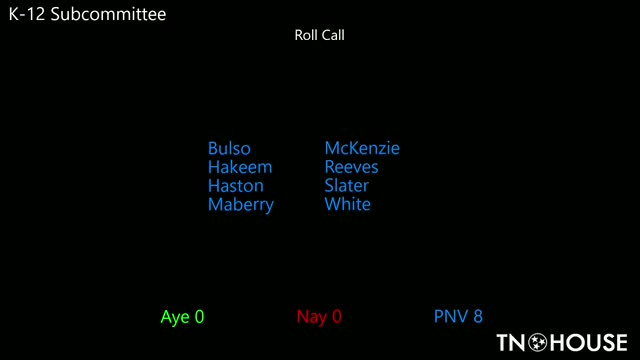K-12 Subcommittee advances bill to move Literacy Success Act comptroller report from annual to every three years
Get AI-powered insights, summaries, and transcripts
Subscribe
Summary
At a K-12 Subcommittee meeting, members voted 8-0 to advance House Bill 187 to the full education committee. The bill, sponsored by Representative Mayberry, would change the Office of the Comptroller's Office of Research and Education Accountability (OREA) reporting requirement on the Literacy Success Act and districts' foundational literacy skills plans from annually to once every three years.
At a K-12 Subcommittee meeting, members voted 8-0 to advance House Bill 187 to the full education committee. The bill, sponsored by Representative Mayberry, would change the Office of the Comptroller's Office of Research and Education Accountability (OREA) reporting requirement on the Literacy Success Act and districts' foundational literacy skills plans from annually to once every three years.
Supporters said the longer interval would allow OREA to compile more meaningful trend analysis and conduct deeper reviews. Comptroller Jason Mumpower said, "we have performed this study every year since the original legislation passed. However, 1 thing we find is that allowing it to be done every 3 years would provide better data in terms of being able to recognize trends and" and to conduct interviews and surveys identifying which interventions have the biggest positive impact on students' reading proficiency.
Members cautioned that annual reporting was an important selling point when the program was adopted because it supplies timely data for interventions. Representative Mackenzie asked, "Why wouldn't we be able to do that on an annual basis?" and expressed concern that students who need help between report compilations could miss timely interventions. Representative McKean and others sought clarification about interim access to data for local education agencies (LEAs) and the Department of Education.
Comptroller Mumpower and committee members drew a distinction between raw data and the comptroller's compiled report. Mumpower said the comptroller's office compiles the report and is not responsible for program management or day-to-day interventions. He added that the underlying data remain available from the Department of Education, and Representative McKean and others noted that LEAs and the department could act on test results and other data before a compiled OREA report is produced. A committee member summarized: the data would still exist and could be requested from the Department of Education between OREA report cycles, but OREA would compile a fuller analysis on a three-year cycle.
Supporters also said the change would free OREA capacity to respond to other study requests from the committee. Representative Slater said moving to a three-year compilation "will help and enhance" policy work because it allows trend analysis while not preventing local or state action based on more immediate data.
On the motion to advance the bill, the clerk recorded eight yes votes and zero no votes; the measure was reported out to the full education committee. The committee concluded its calendar and adjourned.
Members signaled intent to follow up with the Department of Education about obtaining interim data and timelines for district-level information so that local interventions need not wait for the three-year compilation.
